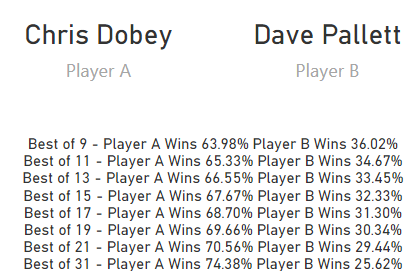As we're approaching the Matchplay, which is one of the few events per year where we actually have very long matches, it's only fair to question - how much of an edge does a longer match give a better player?
Fortunately we can shove this into the master computer and find out. First, let's take two quite evenly matched players:
There's not much of a difference between games of any given length. Hughes is only just more than 1% above a flip in a best of nine, but you could make it best of 31 (which, unless anything's changed and I haven't noticed, is the longest "standard" leg play we have, I calculate under Matchplay rules differently given the tiebreaker) and he doesn't even gain another percentage above 50%.
Now, let's take two not very evenly matched players:
Here, I've taken the player with the lowest winning points per turn and stuck him up against the player with the highest winning points per turn (I bet the name in question surprised you, no?). Again, the length of match isn't going to make much difference - simply because the better player is already winning a huge proportion of games over a short format, there isn't much room at all to improve.
So I think the difference in skill where a longer match really matters is somewhere in the middle. Let's find a pair of opponents where the better guy starts at around 60% in a standard Pro Tour match:
Here, it swings 6.4% in favour of Suljovic going from best of 11 to best of 31. It could only possibly have swung 3.7% in the Cross example. How about a pair of players where it's a bit more one sided, say, 65% on the Pro Tour?
Here, there's a bit more of a swing, it's over 9%. Are we getting near the sweet spot where the length of game matters most? Let's push the Pro Tour win percentage up a bit more:
That's even more again - it's more than a 10% bump. What if it starts out even more one sided?
That's as close to 75% to win on the Pro Tour as I'm going to find, and that goes up nearly 12%. Can we push it up any more?
Took far too long to find anything close to 80%, so this'll have to do - it's still about a 12% swing.
I think this gives us a decent idea - an excessively long match like you see in the quarters of the Matchplay and Grand Slam onwards definitely improves the chances of the better player, but it has the most effect where the better player would already be around a 3-1 or 4-1 favourite in the short match, which needs quite a big skill difference to begin with. A larger favourite simply doesn't have enough room to boost his or her winning chance before they get too close to 100%, whereas smaller favourites simply aren't big enough favourites to be able to properly take advantage of the difference in quality. Something to bear in mind if you're doing your own analysis of Blackpool in the next couple of weeks - if you think someone would be 60/40 on the Pro Tour, but would be lock of the week to win in a Matchplay quarter final, you're doing it wrong.







No comments:
Post a Comment